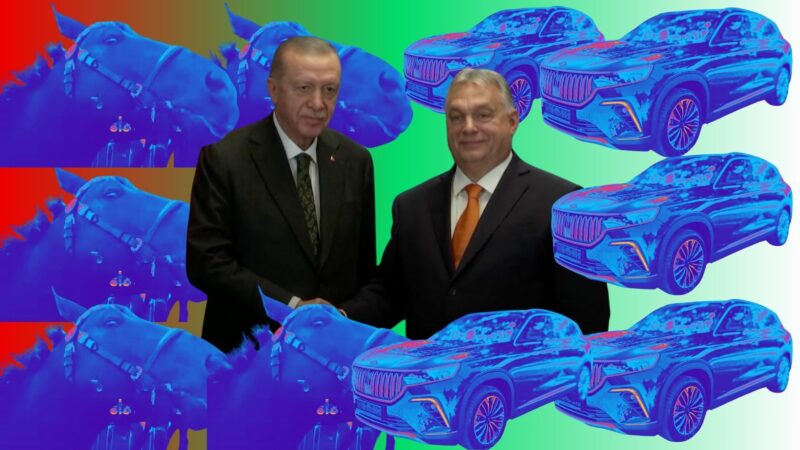
Image by Arzu Geybullayeva
In December 2023, Turkey's President Recep Tayyip Erdoğan traveled to Hungary, where he met with Prime Minister Viktor Orban. With December being the holiday season, the two leaders also exchanged gifts. Orban gifted Erdoğan a horse, while Erdoğan presented a Turkish-made car — the best deal Orban ever made, according to the Prime Minister of Hungary in a tweet:
The best deal I’ve ever made! For one horse power, I got 435. Welcome to #Hungary President @RTErdogan ! 🇭🇺🇹🇷 pic.twitter.com/RVmEgHROGn
— Orbán Viktor (@PM_ViktorOrban) December 18, 2023
The gift exchange reminded some of last year's blockbuster Barbie, where horses “symbolize the epitome of masculinity,” wrote journalist Ali Walker for Politico.
Both leaders share something more than their love for horsepower. Erdoğan and Orban have been fierce opponents to Sweden's NATO bid, and the meeting, which took place on December 19, may have finally resolved the issue, according to Turkey Recap.
Following Russia's invasion of Ukraine, Sweden and Finland announced their decision to join NATO. However, the decision, which must be approved unilaterally by all 30 member states, was vetoed by Turkey, also a NATO member. Ankara said last year that unless both countries met its demands, it wouldn't approve the bid, “citing their history of hosting members of Kurdish militant groups and Sweden’s suspension of arms sales to Turkey since 2019 over Ankara’s military operation in Syria” according to the Guardian. In addition to Turkey, Hungary also vetoed the decision for the two countries to join the alliance. In February 2023, Turkey withdrew from attending a meeting in Brussels between Sweden, Finland, and Turkey, which was meant to hash out the diplomatic standoff over Finland and Sweden's bid to join NATO.
Despite the opposition, Finland joined the alliance in April 2023.
Turkey was at odds with Sweden joining NATO following a Quran-burning incident last year. But Erdoğan's gripe with Sweden goes beyond what the leader described as an “insult to the sacred values of Muslims.” Official Ankara has other asks from Sweden too, including banning pro-Kurdish demonstrations in Sweden and extraditing various individuals Turkey labels as terrorists, wrote journalist Amberin Zaman.
The meeting between Prime Minister Orban and President Erdoğan on December 18, 2023, took place behind closed doors. “The pair didn’t mention NATO expansion in a joint presser that day, but their governments have held back the last two votes required to approve Swedish accession, and observers believe the visit likely involved coordination on whether to advance Stockholm’s bid,” wrote journalist Diego Cupolo.
But days after the meeting, it looked like the two did not make much progress on reaching an agreement on Sweden's NATO bid:
“There’s no Turkish-Hungarian agreement” on Sweden’s NATO accession, Orbán claims – days after Erdogan visited him in Budapest.
He adds that his MPs are not enthusiastic voting on the treaty because, after they approved Finland’s membership, Finland sued Hungary the next day.🤨 pic.twitter.com/VnWTUXdeeH
— Szabolcs Panyi (@panyiszabolcs) December 21, 2023
In addition to a horse, Orban also pledged support for granting Turkish citizens visa-free travel in Hungary, according to reporting by an online news platform Gercek Gundem.
The two leaders also share a few other commonalities. Both Orban and Erdoğan rule their countries with an authoritarian populist playbook and both excel in manipulating public opinion, silencing independent voices and intimidating opponents, building beneficial ties with business elites, and portraying their respective governments as true patriots, to name a few. According to Stephen Pogany, an emeritus professor at the University of Warwick these nationalistic claims are “absurd and disturbing:”
No single political party can plausibly claim to represent the supposed values of an entire people or have a monopoly on patriotism. In seeking to entrench their political ascendancy, however, the authoritarian-populist regimes in Ankara and Budapest have instituted broad-ranging policies to remake the nation in their own image.
As Oliver Hartwich noted in this column, although the two countries are 1,400 kilometers apart, “as far as populism and anti-liberalism are concerned, Erdoğan and Orbán are close neighbors.”
Following the first round of general elections in May 2023, Orban was among the first leaders to prematurely congratulate President Erdoğan on securing victory:
I just called President @RTErdogan to congratulate him on his overwhelming victory in the first round of the presidential elections, and the outstanding and unquestionable victory of @Akparti at the recent Turkish parliamentary elections. Good luck for the second round,… pic.twitter.com/W1ayxB6yBq
— Orbán Viktor (@PM_ViktorOrban) May 17, 2023
Orban later said on a state radio program, “With the re-election of Mr. Erdoğan, a great burden has been lifted from our shoulders. We wished for Erdoğan to be re-elected, but honestly, thank God Erdoğan won. I prayed a lot for him to win.”
For now, one of the few differences between the two countries is their ranking on global freedom indexes. While Hungary ranks “partly free” on the Freedom House ranking, Turkey is ranked as “not free.”






